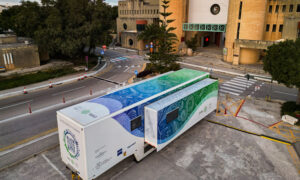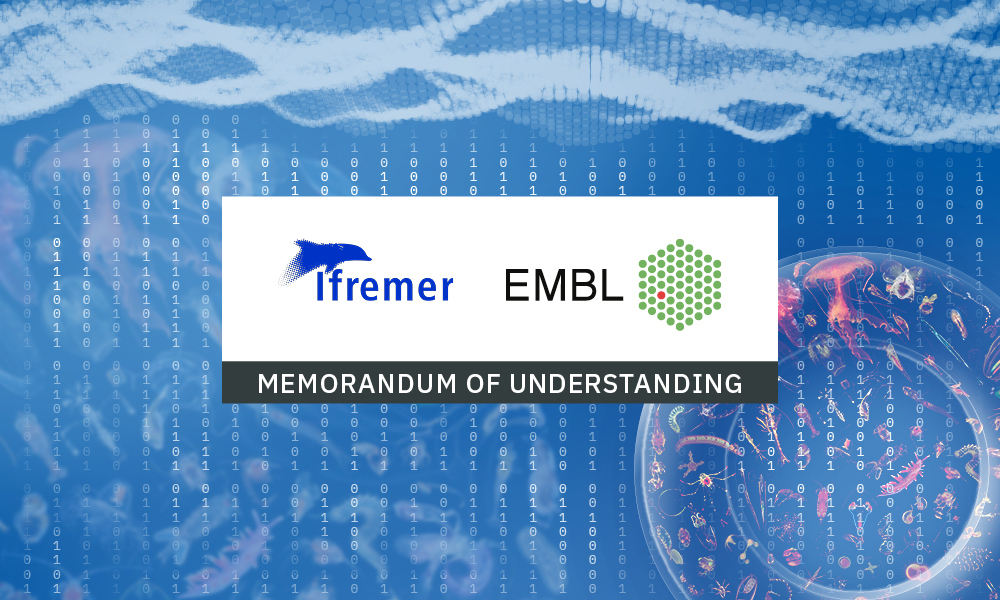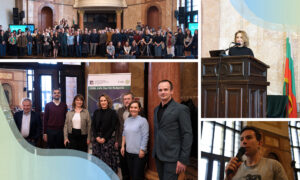
EMBL and Ifremer cooperate to advance ocean sciences
The two organisations have signed a memorandum of understanding to support scientific cooperation in the exploration of coastal and oceanic ecosystems, the study of marine biodiversity, and the understanding of host–pathogen–environment interactions in the marine environment.

Edith Heard, EMBL Director General, and François Houllier, President and Managing Director of the French Research Institute for Exploitation of the Sea (Ifremer), have signed a memorandum of understanding to encourage scientific collaboration between their respective organisations.
Ifremer is a French public organisation that is internationally recognised as a pioneer in ocean sciences. Its goals include protecting and restoring the ocean, sustainably managing marine resources, and sharing ocean data, information, and knowledge.
Data sharing will be an important aspect of the collaboration between the two organisations. Ifremer has already collected a large amount of marine data and can bring sea research expertise and infrastructure, while EMBL has developed technologies to undertake multidimensional measurements, such as advanced omics and imaging technologies, which also incorporate environmental variables.
“In the framework of the new EMBL Programme, and specifically with regards to planetary biology, many valuable research collaborations could arise from and build on this data,” explained Professor Heard. “This is particularly interesting considering EMBL’s plans for a European coastline expedition, which could tie in neatly with Ifremer projects.“
“EMBL has remarkable skills in molecular biology,” adds François Houllier. “Reciprocally, Ifremer has a strong base of expertise in marine biology and ecology. Thanks to our partnership, we will be able to develop new approaches, such as the study of environmental DNA in the deep sea and coastal marine environments, which Ifremer has been studying for a long time, or for the evaluation of fisheries resources.”
Researchers from both organisations will be able to join forces, particularly in the areas of coastal and marine ecosystems, biodiversity, and host–pathogen–environment interactions.
This collaboration, along with the perspectives it offers, is built on past interactions and discussions between EMBL and Ifremer, as well as other institutes working on biodiversity and ocean sciences, like the European Marine Biological Resource Centre (EMBRC). Most recently, an online Marine eDNA Workshop has been organised in April 2021 by EMBL, Ifremer, and the Tara Ocean Foundation.
Coopération entre l’EMBL et l’Ifremer pour faire progresser les sciences océaniques
Les deux organisations ont signé un protocole d’entente pour soutenir la coopération scientifique dans l’exploration des écosystèmes côtiers et océaniques, l’étude de la biodiversité marine et la compréhension des interactions hôte–pathogène–environnement en milieu marin.
Edith Heard, directrice générale de l’EMBL, et François Houllier, président et directeur général de l’Institut Français de Recherche pour l’Exploitation de la Mer (Ifremer), ont signé un protocole d’entente visant à encourager la collaboration scientifique entre leurs organisations respectives.
L’Ifremer est un organisme public français, reconnu au niveau international comme pionnier dans le domaine des sciences de la mer. Ses objectifs portent sur la protection et la restauration de l’océan, la gestion durable des ressources marines, ainsi que le partage des données, des informations et des connaissances sur l’océan.
Le partage des données va représenter un volet important de la collaboration entre les deux organisations. L’Ifremer a déjà collecté une grande quantité de données marines et va pouvoir apporter son expertise et ses infrastructures en sciences océaniques. Par ailleurs, l’EMBL a développé des technologies permettant d’entreprendre des mesures multidimensionnelles, telles que des technologies avancées en imagerie et en omiques, et d’intégrer des variables environnementales.
“Ces données peuvent donner lieu à d’importantes collaborations en matière de recherche dans le cadre du nouveau programme de l’EMBL, et plus spécifiquement en biologie planétaire,” explique le professeur Heard. “Ceci est particulièrement intéressant compte tenu des intentions de l’EMBL de lancer une expédition scientifique sur le littoral européen, qui pourrait s’articuler parfaitement avec les projets de l’Ifremer.”
“L’EMBL a des compétences remarquables en biologie moléculaire,“ renchérit François Houllier. “Réciproquement, l’Ifremer a un socle de compétences en biologie et écologie marines. Grâce à notre partenariat, nous pourrons développer de nouvelles approches comme l’étude de l’ADN environnemental dans les grands fonds et les milieux marins littoraux et côtiers que l’Ifremer étudie de longue date, ou pour l’évaluation des ressources halieutiques.”
Les chercheurs des deux organisations vont être en mesure d’unir leurs forces, notamment dans les domaines de la biodiversité marine et des interactions hôte–pathogène–environnement.
Cette collaboration, et les perspectives qu’elle offre, s’appuie sur des interactions et des discussions entre l’EMBL et l’Ifremer, et d’autres institutions travaillant dans le domaine de la biodiversité et des sciences océaniques, telles que le Centre européen de ressources biologiques marines (EMBRC). Plus récemment, un atelier en ligne sur l’ADN environnemental en milieu marin a été organisé en avril 2021 par l’EMBL, l’Ifremer et la Fondation Tara Océan.


